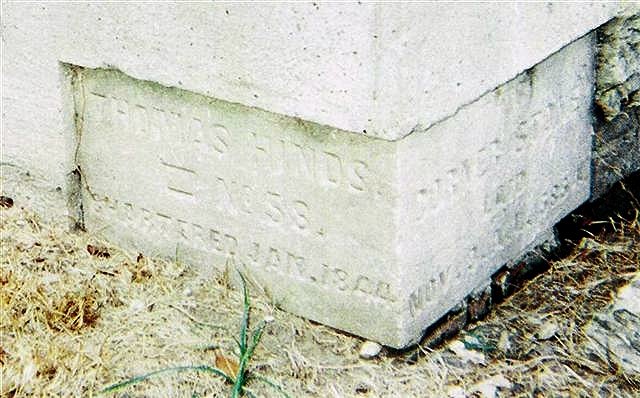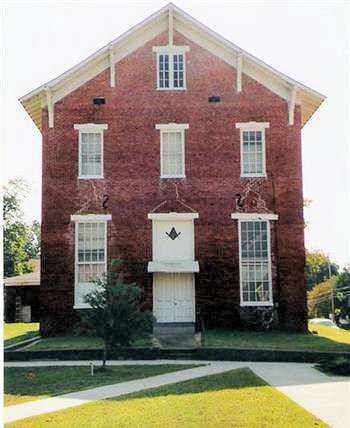
 Jefferson County, Mississippi
Jefferson County, MississippiA Proud Part of the Mississippi GenWeb!
Contact Us:
State Coordinator: Jeff Kemp
County Coordinator: Gerry Westmoreland

If you have information to share, send it to Jefferson County MSGenWeb.
In the menu on the left there is an index of History Records on our website.
Jefferson County has a long and rich Masonic History. The
Jefferson Lodge and its members have been a vital part of the fabric
of this county since the settlement of this area. Many of the
earlier members were members back in Colonial America before they
arrived in the Natchez District. Many were descended from Freemasons
in England and Scotland before coming to the United States.
Freemasonry is still today, a living, vital force in our county.
"Masons are men who voluntarily asked to join a lodge. They
were accepted because they were good men who believe in God and hold
high ethical and moral ideals. They go to meetings which they call
the lodge, in order to learn and to teach what 'friendship,
morality, and truth really involve, and to practice on a small scale
the reality of brotherhood. They also have meetings open to their
wives, children, and friends where they promote an understanding of
the serious nature of the Fraternity by entertainment and
sociability. Practical programs for charity and relief are planned
and executed. The special kinship they feel for each other as a
brotherhood is their deepest satisfaction."
[From the Masonic
Service Association's
Short Talk Bulletin]
This is the first Lodge to be organized by the Grand Lodge of
Mississippi
(Page vi, Proceedings of the Grand Lodge of
Mississippi, 1882.)
Dispensation granted 1820; Chartered 1
January 1821; defunct 9 January 1833. Liabilities assumed by Thomas
Hinds Lodge No. 58 in 1842, Jefferson County, Fayette.
*Lodge location in Return published 1830 is Fayette.
Membership Return for year ending January, 1822, Warren Lodge No. 4, Jefferson County, Greenville
Officers
Thomas Hinds, W. Master
Nathaniel Ives, Senior
Warden
Filmer W. Green, Junior Warden
Philip A. Gilbert,
Treasurer
Philip Dixon, Secretary
Charles West, Senior Deacon
William Gillespie, Junior Deacon
Robert Forleef, Steward and
Tyler
Members..........28
Initiated...............6
Passed................8
Raised.................8
Admitted..............1
Demitted..............3
Attest,
Philip Dixon, Secretary

Membership returns for various years
1949 -
Stated Communications held on the Second Thursday of each month.
1949 OFFICERS
William H. Roberts, M.
R. Appleton Owen,
Sec'y.
Robert J. Boyte, S. W.
Donald C. Pitts, Jr., S. D.
Clarence E. Arnold, J. W.
Carroll E. Youngblood, J. D.
William
T. Harper, P.M.,Treas.
William H. Wright, Tyler
PAST
MASTERS
Bates, Pettus Estell
Ballard, Charles E.
Carroll,
P. Jones
Corban, Robert Lee, Jr.
Darsey, Sidney
Farr, John
Vail
Griffing, Robert H.
Harrigill, Kirby N.
Harrison,
Percy David
Liddell, Rommie T.
Marron, Claude I.
O'Quinn
Edgar Byron
Pitts, Donald C., Sr.
Pritchard, Robert T.
Spencer, Henry H.
White, Joe B.
Winters, William H.
INITIATED
Anding, Frank
Buckles, Wilmer M.
Duck, Alvin B.
Griffith, Robert Garland
Lehmann, Kenneth Stanley
Tedder, Hugh
Wilton
PASSED
Anding, Frank
Buckles, Wilmer M.
Duck,
Alvin B.
Griffith, Robert Garland
Holman, Kneeland High
Lehmann, Kenneth Stanley
RAISED
Anding, Frank
Buckles,
Wilmer M.
Duck, Alvin B.
Griffith, Robert Garland
Holman,
Kneeland High
Lehmann, Kenneth Stanley
AFFILIATED
Cammack, Luther E.
Case, William Otis
Uhl, James F.
Youngblood, Carroll E.
REINSTATED
Hazlip, Cosby W.
SUSPENDED N. P. D.
Steele, H. C.
DIED
Buckels, John M.,
Sr. August 15, 1949
Huttenlocker, Frank, E. W. May 9, 1949
Total…………………….103
BY CHARLES DAWKINS
 That’s
the score from a turn-of-the-century legal battle between the
Fayette Presbyterian Church and the Thomas Hinds Masonic Lodge.
That’s
the score from a turn-of-the-century legal battle between the
Fayette Presbyterian Church and the Thomas Hinds Masonic Lodge.
The story of the oldest brick building still standing in Fayette
begins in 1825, when the county seat of Jefferson was moved from Old
Greenville to Fayette.
Prior to that time, Greenville had served as the
county seat since 1802 and had become a center of commerce, with
numerous businesses, a post office, a private school and a
courthouse.
Many prominent Mississippians lived or conducted
business in Greenville, including Andrew Jackson, Thomas Hinds,
Thomas Calvit, Joseph Davis, Jefferson Davis, Dr. Rush Nutt, Cowles
Mead, Aaron Burr, David Holmes, Seargent Prentiss, George
Poindexter, Thomas Marston Green, Abijah Hunt, Cato West, Dr. John
Shaw, Tobias Gibson, the Rev. Adam Cloud and Richard Curtis.
But as the county grew to the north and the east, sentiment spread
to move the county seat to a more central location; so in May 1825,
a tract of land was purchased from Henry Platner, and Jefferson
County's first brick courthouse was begun at the newly named site of
Fayette, named after Revolutionary War hero, Marquis de Lafayette.
The move affected the many businesses in Greenville and the town
began to dry up. Also affected was one of the oldest Masonic lodges
in Mississippi, Warren Lodge No.4, organized at Greenville in 1821.
Warren Lodge members met at Greenville until February 1829, at
which time, by authority of the Grand Lodge, it was moved to
Fayette, and the meetings were held in the second story of a house
across the street from the present lodge building.
Warren
Lodge continued until February 1833, when it voluntarily surrendered
its charter and for the next 10 years there was no Masonic lodge in
Fayette or in Jefferson County.
In 1843, the Grand Lodge was
petitioned for restoration of the charter for Warren Lodge, which
was granted. The name was changed to Thomas Hinds Lodge No. 58 in
honor of Gen. Thomas Hinds, a member of the lodge and a hero of the
War of 1812.
Gen. Andrew Jackson said of Hinds, "You have
this day been the pride of one army and the admiration of the
other."
On Jan. 16, 1846, the lodge purchased a lot from
Charles Clark and Ann Eliza Clark. Eight years later, in 1854, lodge
members were contemplating the erection of a two-story building on
the lot, with the upper story to be used as a lodge room and the
lower to be rented for business purposes.
At that time there
was no Presbyterian church in Fayette, but there was a church at
Ebenezer, about six miles east.
The pastor of that church,
Henry McDonald,' wrote a letter to the lodge proposing that the
Presbyterians would furnish the 'means to build the first story,
which would be used as their church, and the lodge would use the
upper building for their meetings, with the right of conducting
ceremonial sessions in the church.
After much negotiation, an
agreement was reached whereby the lodge would furnish the brick for
the building and the church would build the first story and furnish
it for use as a church.
The lease would be for 33 years, at
which time the lease would be renewed at the will and pleasure of
the lodge, and was contingent upon the church paying one-third of
all necessary repairs on the building for that period of time.
So on Dec. 9, 1859, the Mississippi Presbytery adopted a
resolution that authorized the Ebenezer Church to set off a part of
its members to be organized into a church at Fayette.
The
Fayette Presbyterian Church first met on February 25, 1860, in their
new building with 33 members and Mr. McDonald as pastor.
In
1875, the church was in arrears of payments for its’ share of
repairs made by the lodge upon the building. On January 1, 1876, a
new 33-year lease was executed between the church and the lodge.
Thirteen years later, the church raised $1,300 to renovate and
remodel the inside of the first floor. The old inside galleries were
taken down, the pillars replaced with massive columns as supports
and the old-fashioned square windows narrowed and fitted with
colored panes .
Then in December 1908, the lodge notified the
church that their 33-year lease would soon expire and offered a new
10-year lease with an annual rental fee, first affixed at $75, then
$60, and then $36.
This offer was rejected by the church.
Litigation was begun, resulting in the case being reviewed by the
Mississippi Supreme Court.
The court ruled in favor of the
lodge, and the church was given notice by the lodge to vacate the
premises on June 4, 1909.
The Presbyterians moved their
services to the old Christian Church building and in 1917 a lot on
Main Street was purchased and erection of a new church was begun.
Regular services were held at the new Main Street church for 50
years, until membership began to decline and when the last service
was held there on November 24, 2002, only four members remained.
The Presbyterian Church building was sold in April, 2005 to the
Raining Manna Christian Center, which now holds regular services
there.
Membership in the Thomas Hinds Lodge also declined
until only four active members were left and the lodge dissolved.
The brick building was sold in October 2004 to a Brookhaven lumber
company.
A spokesman for the lumber company said plans for
the oldest brick structure still standing in Fayette are indefinite.
Click on photo for larger view
All photos except
the Lodge building - courtesy of Tom Harper
Lodge Photo by
Charles Dawkins
Masonic Graphics from Masonic Grand Lodge